General
The Giants are Awake-Academia Discourse on Development Concurs
Published
10 years agoon
On 8th October 2014, a day shy of Uganda’s 52nd Independence anniversary, the Makerere University Main Hall played host to a panel discussion organized by the University Forum on Governance (UNIFOG) in partnership with Konrad-Adenauer-Siftung (KAS). Based on the theme “Awakening the Giants: The Academia and Development Discourse in Uganda” the discussion drew participants mainly from the Humanities and a host of Staff, Students and members of the general public.
Giving the opening remarks, Konrad-Adenauer-Siftung’s Programme Officer for Uganda and South Sudan Ms. Maike Messerschmidt noted that her organisation was particularly excited about the day’s debate considering that it had set to analyse and highlight the role of academia in Uganda’s development.
“The question of the role that the academia plays, or should play in development and even politics is not limited to Uganda. All over the world, the academia is often stuck between two poles of getting caught in the ivory tower and its concepts and theories and connecting closely, and as many might say, too closely to everyday realities, and we therefore want to thank UNIFOG for the great initiative,” said Ms. Messerschmidt.
In his remarks, UNIFOG’s Executive Secretary Mr. Bruce Kabaasa thanked KAS for the support to this important initiative as well as the panelists for agreeing to discuss the day’s topic, and the students for their huge turn up. He then introduced the day’s panelists: Dr. Simba Kayunga Ssali, Lecturer-Department of Political Science, College of Humanities and Social Sciences (CHUSS); Dr. Asiimwe Godfrey, Head-Department of Philosophy and Development Studies, CHUSS; and Dr. Tanga Odoi, Department of History, CHUSS.
To break the ice and ensure that everyone was on the same page, Dr. Sarah Ssali, Senior Lecturer-Department of Women and Gender Studies, CHUSS put the day’s topic into perspective by noting that the academia has indeed excelled in all fora of development and governance where they were well facilitated. She also noted that although there was widespread promotion of practical skills, one can never practice what they have not theorized.
“The history of society is the history of production, dissemination and knowledge and the ideas that drive society are incubated and nurtured within the academia. As the academia is a reflection of the larger society, what then comes out depends on how the larger society invests in this kind of academia. The status of society then depends on the value they attach to the academia” observed Dr. Ssali.
Comparing the post-independence Makerere of the 1960s and the current one, she decried the continual alluding to practices and subjects that help to create the well-rounded graduates as belonging to the ‘old elite club’. “Everything to do with the old elite club is not considered lately. Shakespeare was recommended reading for Medical School in the sixties but all this is no more,” she said.
Remarking on the Government emphasis of Sciences over Humanities Dr. Ssali pondered “Who is going to shape the agenda in conflict and resolution if we think that humanities are not useful?” She observed that the biggest conflict now lay in thinking. She then urged the all Humanities students to take their courses seriously considering that their “thinking only” nature is helpful in demonstrating that research will have policy impact.
“How prepared are we if we don’t rethink our position as our population grows? As academia, we also stand to be blamed for having conformed rather than challenged regardless of the time. But we need to know that the solutions of today will not solve the problems of tomorrow and we need to do something about it. Ugandan academia needs to shape development discourse so that we nurture the nature of inquiry that produces it” she observed.
She concluded her introduction by posing three key questions; does our academia really need awakening and are we a sleeping giant? Are we to blame for the lack of development in this society and is this a problem of we the individual academics or of the wider context we are located in? Is there more we can do to shape the development discourse of this country; and if there is, what more can we do and how best can we turn the trend around?
In his contribution, Dr. Simba Kayunga Ssali concurred with the opening remarks that the giant was indeed awake but whether he was a giant at all was topic that would make for interesting discussion. He further noted that although development is still a debate, how to overcome underdevelopment was also still a debate.
Dr. Simba then endeavoured to lay out the role that academia has played and continues to play since independence. One of these is knowledge generation as evidenced by the various forms of research findings published annually by Universities such as Makerere. Regarding the role of policy formulation he cited: the Common Man’s Charter (Move to the left) as a work of an academic; the Plan for Modernisation of Agriculture (PMA) blueprint developed by Professor Godfrey Bahigwa; the Local Governments review commission of 1986 led by Professor Mahmood Mamdani; Reorganising Uganda’s foreign policy; The 2004 White Paper Defence Transformation in Uganda; as well as the fact that Uganda’s National Planning Authority (NPA) is headed by a member of the academia Dr. Joseph Muvawala. He also noted that the academia was involved in governance through their professional capacities as Board Members of various Government Parastatal bodies and Companies.
He however also outlined challenges faced by the academia as: dissemination of research, noting that our research does not seem to reach policy makers or even make it to the recommended reading list for course outlines in our own university; the lack of willingness by Government to consume our own Ugandan views; the disastrous semester system which preoccupies staff with marking and teaching with little room left for intellectual debate; and neo-liberalism which has created a cynic standardization and universalisation of discourse. “There are certain things which you are supposed to take as universal. We in the Department of Political Science are supposed to say that liberal democracy is the standard way of going about our politics and there are no alternatives” added Dr. Simba.
Dr. Simba also noted that neo-liberalism has created some forms of powers which shape debates. “For example you cannot conduct a healthy debate on Genetically Modified Organisms (GMOs) without attracting persecution from the powers. And if you tried to say that homosexuality is bad, you are risking not being given a visa to the west. Those controlling the market and those controlling global politics are forcing us to think in a certain direction because of the powers they have over us” he said in conclusion.
Commenting on the day’s them, Dr. Asiimwe Godfrey noted that this debate was long overdue in Uganda since the academia has not been sleeping but had been actively engaged in research. He however pointed out that this involvement had only been at individual level, with researchers selectively chosen to vindicate the status quo and write the research of the rule. He further noted that development was about humanity and society but there was need to first understand this humanity and society before it can be developed. He observed that this was the basis for the countries of East Africa coming up with research institutions like; The Institutes of Development Studies in Nairobi and Dar es salaam as well as the Makerere Institute of Social Research (MISR) in Uganda.
He noted that these research institutions fed the policy making process and formed the synergy between the Fifth Estate (Academia) and the Government. He however traced the commencement of “sleeping” to the 1980s which saw a decline in research and analysis in development policy making and the emergence of new actors of neo-liberalism such as Non-Governmental Organisations (NGOs), National Institutes and Think Tanks. These, he said redirected the course of national policy formulation.
“The neo-liberal agenda was to direct development towards its interests of modernization of Africa and marketisation, and I think that was the point of departure. This was meant to accelerate Africa’s development and move it from backwardness to modernity. Accordingly, the State was rolled back and that led to the disconnection with its linkage with policy research and coordination with the Fifth Estate and from then on, university voices in contemporary development had to reform, comply or were marginalized” explained Dr. Asiimwe.
He further noted that this development came with reduction in funding both to operations and research at public universities, which led to a discourse that portrayed Higher Education in Africa as a luxury and unproductive. As a result, the 1980s ushered in the consultancy industry as a quick fix for complex African problems and market failures which led the poorly remunerated Scholars in Makerere looking for lucrative engagements in the marketplace. Dr. Asiimwe further noted that as a result, critical thinking was often referred to as divisive.
“Like most Africans, technocrats are also lazy readers and eventually they are conceptually dependent on parroting from foreign models and equations. And leaders also prefer shortcut policy briefs; saying our reports are so rigorous, laborious and idealistic, and prefer roadside political adhocism for purposes of expediency. African Scholars have also not been left out. While some became reformist, others fitted into this system by looking for greener pastures in these new agencies which leaves the begging question, whose university and whose development agenda?” questioned Dr. Asiimwe. He thereafter concluded that “The Academia; the Fifth Estate must be brought back in. Critical thinking is not subversion and I would like to maintain that it is better than destructive praise.”
The third and last panelist of the day Dr. Tanga Odoi in his contribution opted to start by saying that the problems of academia and development discourse in Uganda was a problem of leadership. “I don’t want to blame colonialism after all these years, I don’t want to blame the climate, I want to think that leadership is the problem” he said in opening. He further stated that the Government has not helped the Academia but has instead led to a situation where the people that can shout the slogans of the party are more protected than the scholars. Justifying his stand, he observed that the Primary School teacher of 1964 was more respected with regard to pay and societal position than a University Lecturer of today.
He pointed out that this situation was further exacerbated by the colonial era which still controls how much support goes towards a particular sector in education, and eventually the number of vibrant people who can challenge the status quo. He therefore noted that each country must have its own objectives in order to develop through initiatives like five-year development plans with universities such as Makerere as the engine.
“The engagement we have with Government today has turned out to be more personal than institutional. Staff contacted in their individual capacities then go away without even the University knowing that S/he is going to spend hours not teaching but consulting on behalf of or for Government. So why don’t we engage the Government at University level so that experts from Economics, Agriculture, Social Science, Humanities come together to critique and come up with ideas that will direct the country in five years?” wondered Dr. Tanga. “That has not happened and until it happens, we shall not definitely be part of what is being done in Government apart from being part of the voters” he stated.
He noted that by engaging with Government on individual level, the academia was lowering the University to a level of recipient other than participant in the creation and formulation of discourse for the development of this country. He concluded his presentation by noting that “We need to respect that the academia has a place and a guiding role in the country. You cannot develop unless you respect the value of other people. A country that will have been independent for 52years on 9th October 2014 should have National Ministers and not ethnic Ministers.”
The panel discussion which was moderated by Mr. Charles Mwanguhya Mpagi from the Nation Media Group (NMG) then took the debate to the audience where questions, comments and solutions were all fronted in line with the day’s subject. Throughout this discussion, the moderator challenged the audience not to view the situation from without but consider themselves as part and parcel of the solution space.
In the concluding remarks of the day, the panelists concurred that the giant was indeed awake and that consultants do not provide wrong answers but their input was being drafted in ways and timeframes that do not provide appropriate answers to complex problems. They also noted that our poor reading culture makes us jump on development buzzwords but there was need to critique these buzzwords. The Executive Secretary UNIFOG once again thanked the panelists and audience for participating in the debate and KAS for supporting the public dialogue. “UNIFOG is committed to ensuring that Makerere University and other Higher Education Institutions occupy the position of guiding debate,” added Mr. Kabaasa.
Article by Public Relations Office
You may like
General
Admissions opportunity for International students at Indian Institute of Technology (IIT)
Published
2 days agoon
April 24, 2024By
Mak Editor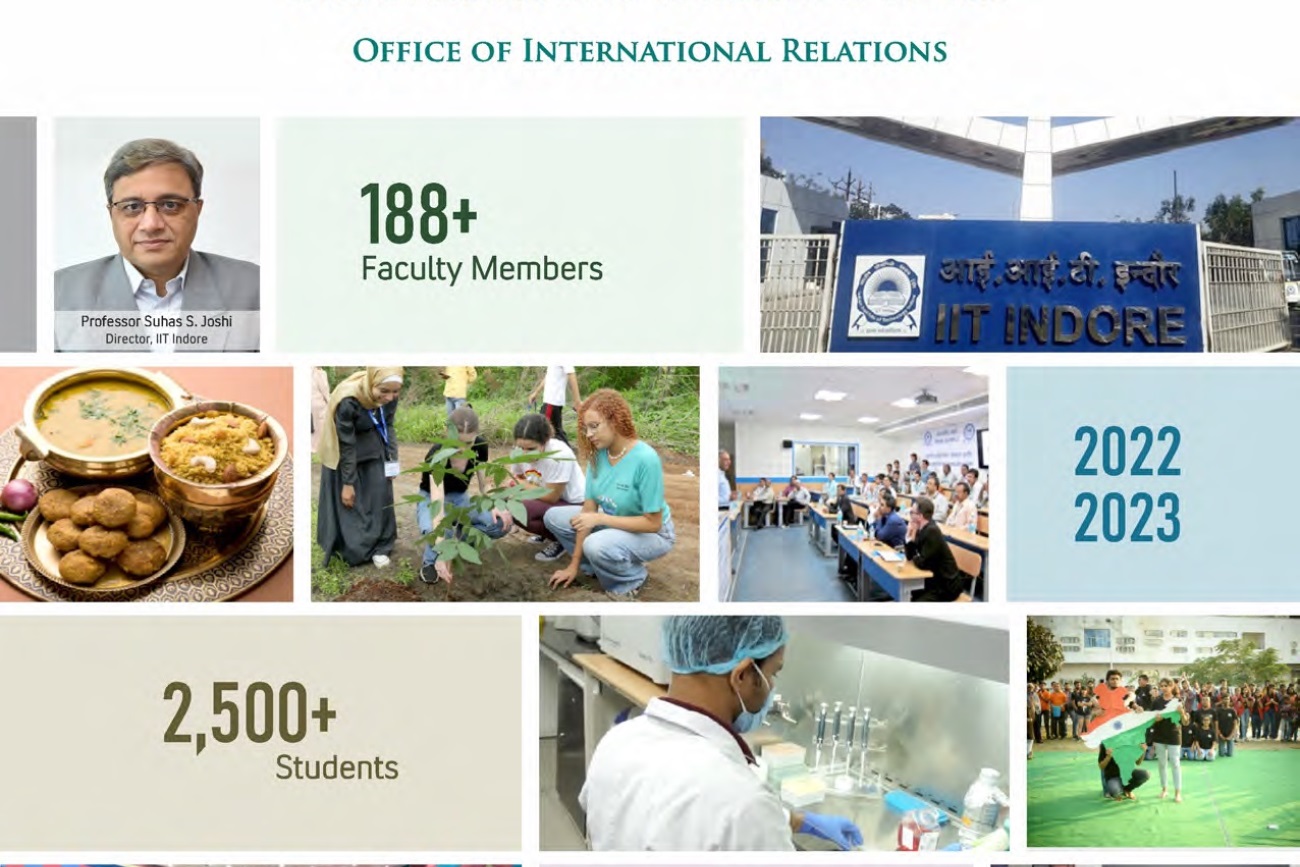
Indian Institute of Technology Indore (IIT Indore), situated in the central part of India in the state of Madhya Pradesh, is an institute of national importance established by the Ministry of Education, Government of India (https://www.iiti.ac.in/_). At present IIT Indore has 11 Departments and 13 Centers of Excellences in Science, Engineering and Humanities offering various UG/PG, Ph.D. programs in diverse fields (https://academic.iiti.ac.in/academic_program.php_. IIT Indore has established state-of-the-art research laboratories, modern lecture halls, on campus accommodation, health center, libraries, Indoor and outdoor sports complex.
Currently, we have 2800+ students and Ph.D. scholars, 200+ highly qualified faculties. IIT Indore has been ranked between 101-150 in Young University Rankings in THE World University Ranking 2023, and 396th QS World University Ranking 2023 with more than 6500 international high impact publications, over 100 technologies and more than 130 patents. We have also established the Advanced Centre for Entrepreneurship (ACE) to foster innovation and entrepreneurship. Moreover, we have signed more than 100 Memorandum of Understanding (MoUs) with various foreign Universities/institutions across the globe.
We are excited to announce that Admissions are now open at IIT Indore for PG and PhD programs for the academic year 2024-25. This provides an excellent opportunity for aspiring international students to pursue higher education in India and broaden their horizons with intercultural programs aimed at offering academic and research exposure.
Students can apply for admission through various programs sponsored by the Ministry of Education, Government of India. These programs include:
- Study In India (SII): The Study in India is a flagship project of the Government of India. The SII program offers scholarships and tuition fee waivers for meritorious students applying to the program. Institutes under the initiative offer from 25% to 100% tuition fee waivers.
Visit the website for more information: https://studyinindia.gov.in/ - Indian Council for Cultural Relations (ICCR): Its objective is to foster and strengthen cultural relations and mutual understanding between India and other countries; to promote cultural exchanges with other countries and people; and to develop relations with nations.
Visit the website for more details: https://studyinindia.gov.in/indian_council_for_cultural_relations_(iccr) and General Announcements for International Students Under ICCR Scholarships: https://iccr.gov.in/announcement - Additionally, students may apply directly under the Self Finance Category. To apply, please send your testimonials and certificates to acaofficer.ir@iiti.ac.in or geeo.ir@iiti.ac.in
Kindly visit the following YouTube page to get more information aboutIIT Indore: https://www.youtube.com/@managerir
General
Mak DARP Project Launch to Revolutionise Management of Academic Records
Published
4 days agoon
April 22, 2024By
Mak Editor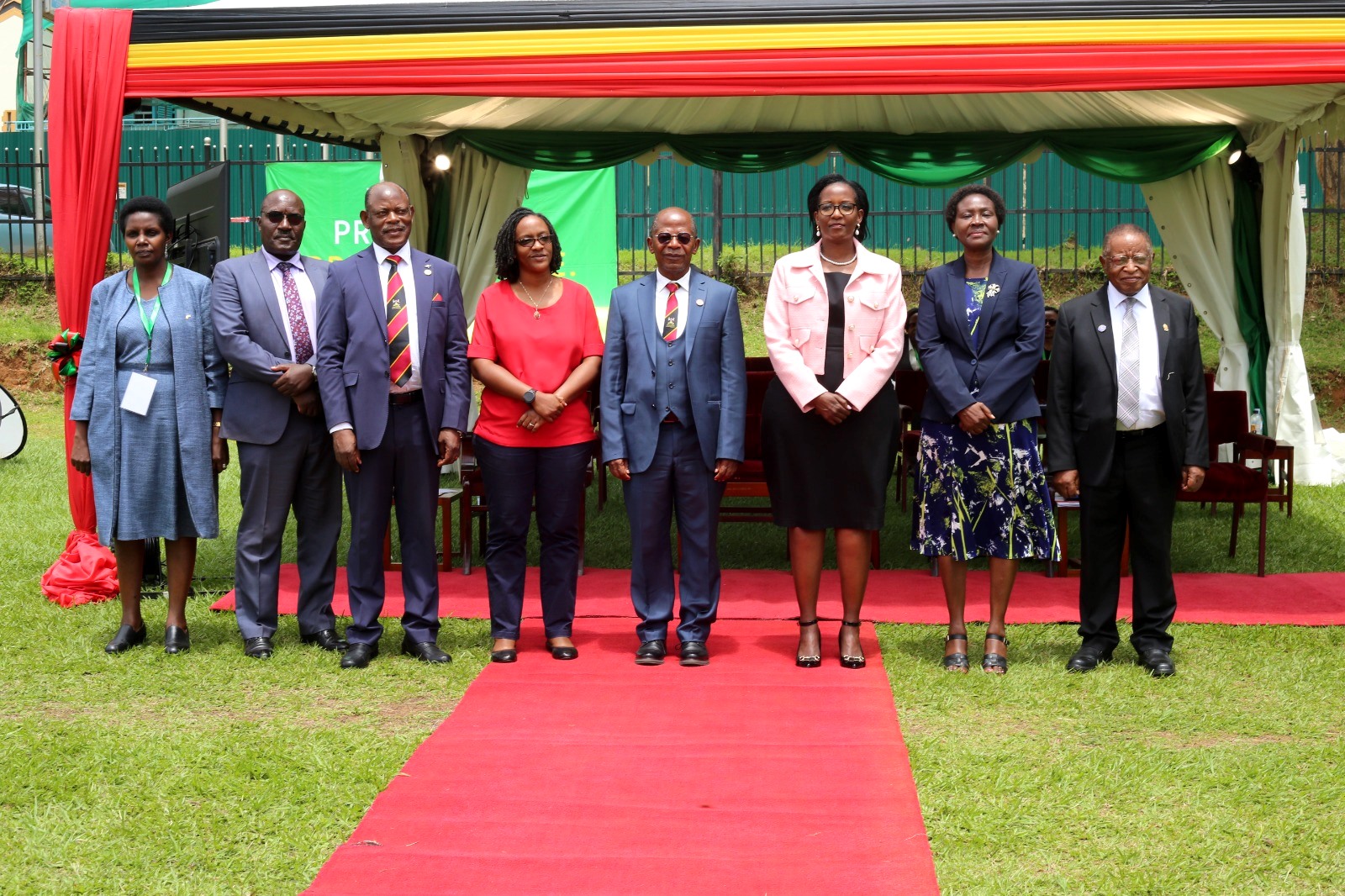
By Ritah Namisango
“This initiative, funded by the Government of Uganda through Makerere University Research and Innovations Fund in partnership with the Mastercard Foundation, represents a significant step forward in our efforts to modernize and digitalize our academic processes. It’s therefore with great pleasure and pride that I launch the Digitalization of Academic Records and Processes project at Makerere University, and I commission the Registry of Students’ Records and the Archive of Students’ Records,” stated the Minister of Education and Sports, Hon. Janet Kataaha Museveni represented by the State Minister for Higher Education, Hon. John C. Muyingo.
As the world continually evolves from manual and traditional methods of records management to modern and digitalized processes, Makerere University launched the Digitalization of Academic Records and Processes (DARP) project to ease the storage, retrieval and acquisition of academic documents by her stakeholders.
The project has digitalized records and implemented new processes as well as established a digital state-of-the-art storage facility at the Senate Building to securely store university academic documents. The digitization process comes along with a university policy that guides on how to record, manage, retrieve and dispose of records not in use. This project is designed to reduce on the substantial amount of space that paper storage systems occupy as well as safeguard records from disasters like fire.
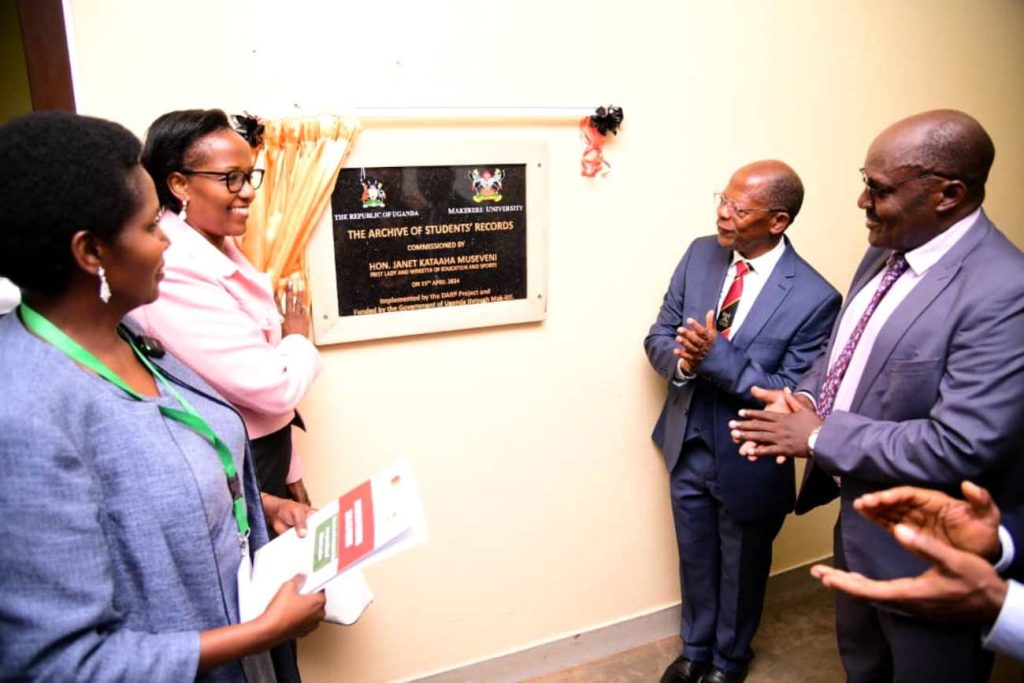
Officiating at the launch of the DARP project on Friday 19th April, 2024 at Makerere University Freedom Square, Hon. John C. Muyingo, affirmed on behalf of Hon. Janet Kataaha Museveni that the launch was a significant milestone in the history of Makerere University.
The Education and Sports Minister further noted that in today’s fast-paced world, universities must manage massive amounts of academic information, and efficient record keeping necessitates that the information is accurate, accessible and secure, benefiting both the institution and its stakeholders. She noted that the DARP system would streamline the processes of managing and accessing academic records, resulting in significant timesaving for students and other stakeholders at the university and beyond.
“Digitalization of academic records and processes is an innovation set to revolutionize the way records are managed by addressing pressing public concerns such as efficiency, security, integrity and accessibility as well as eliminating the unnecessary delays in the processes. The traditional manual approach, while effective in its time has become increasingly challenging to sustain in this digital world, therefore, digitalizing academic records and processes provide crucial responses to the monotonous questions that the outdated manual system never addressed,” stated the Minister’s speech.
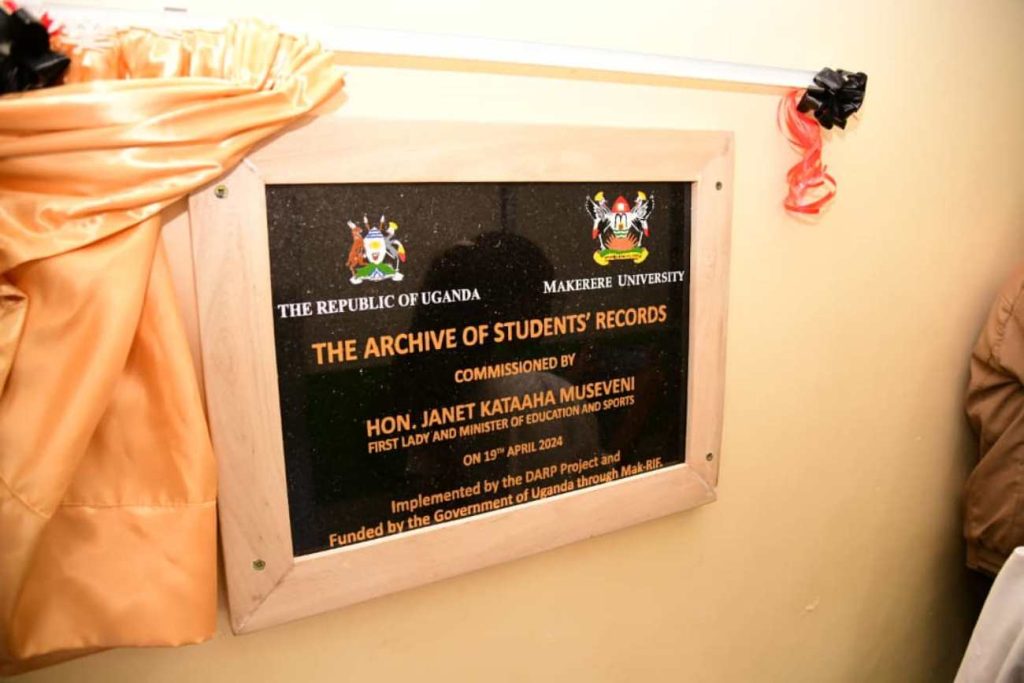
Having outlined the challenges and risks that the traditional paper-based record keeping systems present such as the storage space factor, the risk of mixing active and inactive records, the high rate of wear and tear as well as vulnerability to manipulation of records, the Minister commended Makerere University on the enviable track record of efficiently managing and securely storing its academic documents, Senate minutes, curricula, examination results and students files for nearly a century, despite political upheavals and other challenges.
She observed that digitalized systems would make academic records more accessible to the students and eliminate the frustration of delays caused by bureaucratic inefficiencies and the outdated paper system, enabling them to timely take the necessary steps in academic and professional progression.
As the University embarked on its journey of digital transformation, Hon. Janet Kataaha Museveni equally applauded Makerere for continuously upholding its commitment to academic excellence, research and innovation. She advised the fraternity to stay committed to the principles of innovation and inclusiveness that define the University. As such, she urged them to embrace the digital transformation wholeheartedly so as to harness the power of technology and enable Makerere University to remain a beacon of excellence in the academic world.
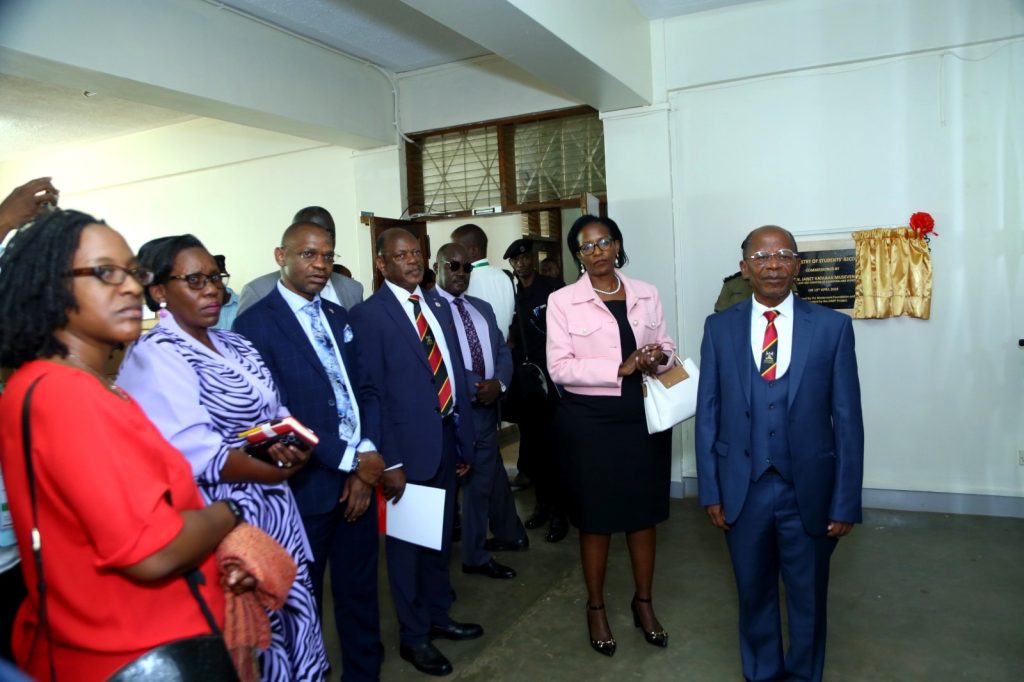
“Since its establishment in 1922, Makerere University has been a beacon of knowledge and learning, shaping the minds of generations of students and contributing significantly to the development of our nation, Africa and the world at large. Thank you for these brains. Your hard work, expertise, and dedication were instrumental in building this DARP project to realization. I am confident that you will have a lasting and positive impact on this university and the entire education sector, not only in Uganda, but the entire world,” said Hon. Janet Museveni.
The First Lady expressed her gratitude for the partnership with Mastercard Foundation and the support it renders in advancing education and innovation at Makerere University.
The Vice Chancellor, Prof. Barnabas Nawangwe highlighted that the launch of the DARP project was not only a landmark achievement for Makerere University, but also a confirmation of the importance that the University Council and Management attach to the role that digitalization and e-services play in implementation of the University strategic plan that continually strives for a professionally managed university.
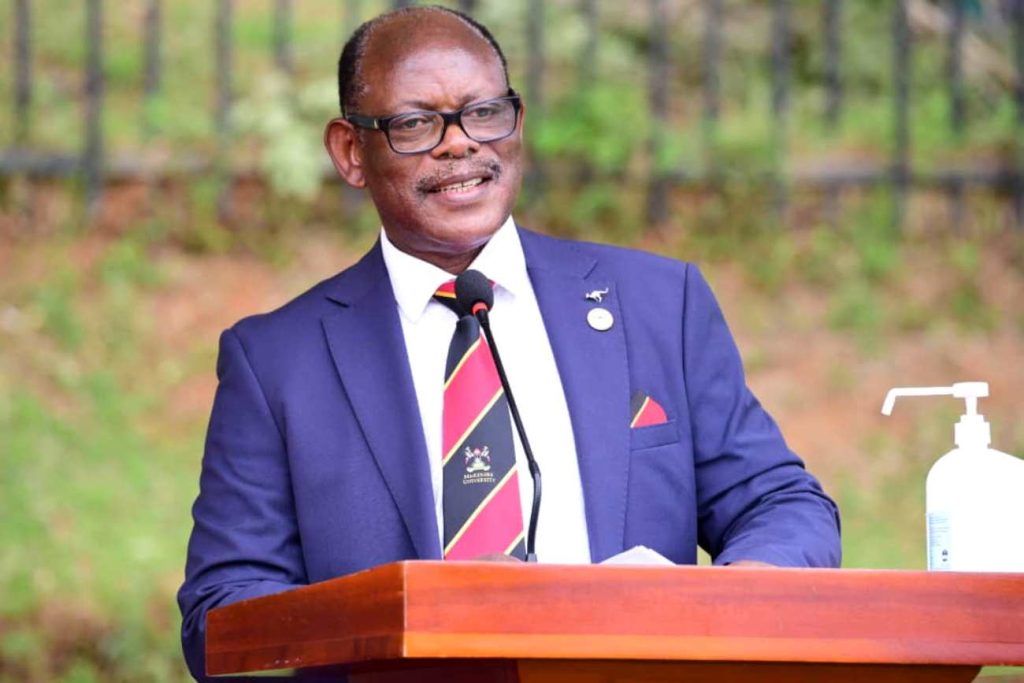
The Vice Chancellor revealed that the official launch of the DARP Project, undertaken in-house by a hardworking team of University staff, was a financial gain on the part of the University and an additional asset in the quest to improve efficiency and effectiveness as far as the University academic records and processes are concerned.
“Our current drive has been the continued digitalization of various business processes and services so as to be more responsive to the dynamic needs of our students, staff and stakeholders. We have been able to achieve this through intentional development of our in-house information systems development capacity, which has saved us a lot of funds in terms of initial purchase as well as annual license renewal costs,” said the Vice Chancellor.
Prof. Nawangwe stated that the DARP project has greatly contributed to the timely and improved service delivery to students and clients. He added that the ultimate goal is to enable students download their own transcripts without need for elaborate physical processes at the university.
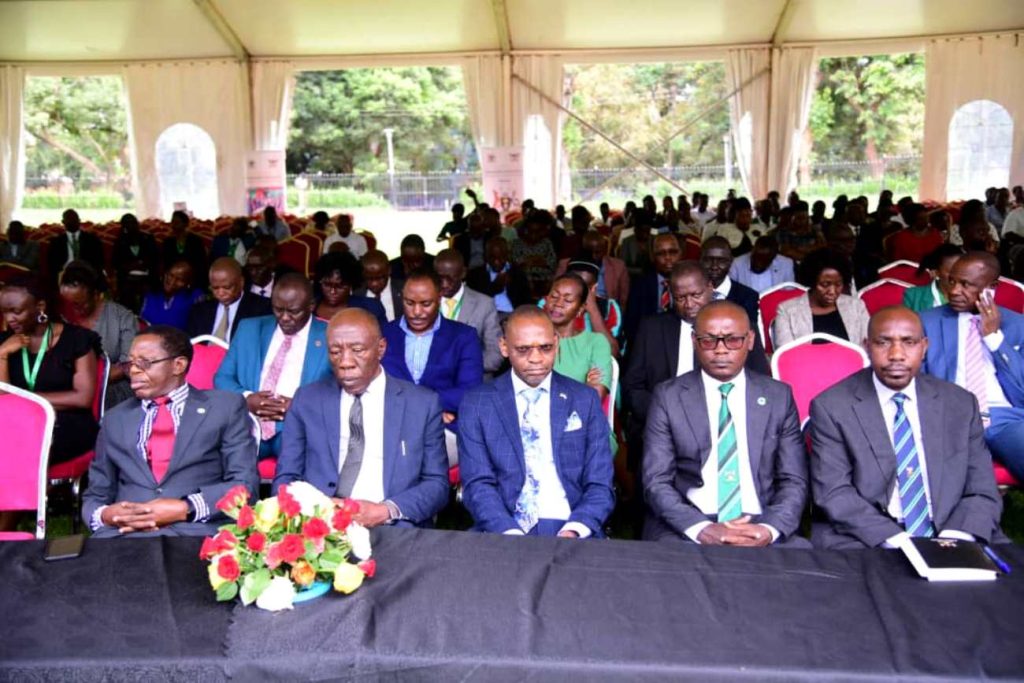
“During the 74th graduation ceremony, Makerere University was able to issue academic transcripts to qualifying students before graduation. I am pleased to inform you that we succeeded in issuing of academic transcripts before the graduation date because of the DARP project, which we are launching today. With the digitalization of students’ academic records, the University is now in a better position to provide the required information and data on time,” said the Vice Chancellor.
Prof. Nawangwe elaborated that Makerere, being Uganda’s Premier University has been a major beneficiary of several initiatives aimed at improving ICT infrastructure and connectivity. He added that the University has been able to achieve this largely due to the generous donations of the Government of Uganda and other development partners. He thanked His Excellency Yoweri Kaguta Museveni, the President of Uganda whose support led to the creation of the Research and Innovations Fund (Mak-RIF) in the 2019/2020 financial year with initial funding of UGX 30 Billion.
He revealed that the funding has continued to be availed throughout the last five financial years, which is clear demonstration that the Government of Uganda esteems Research and Innovation as catalysts to Uganda’s continued march from a peasant to a modern and prosperous country.
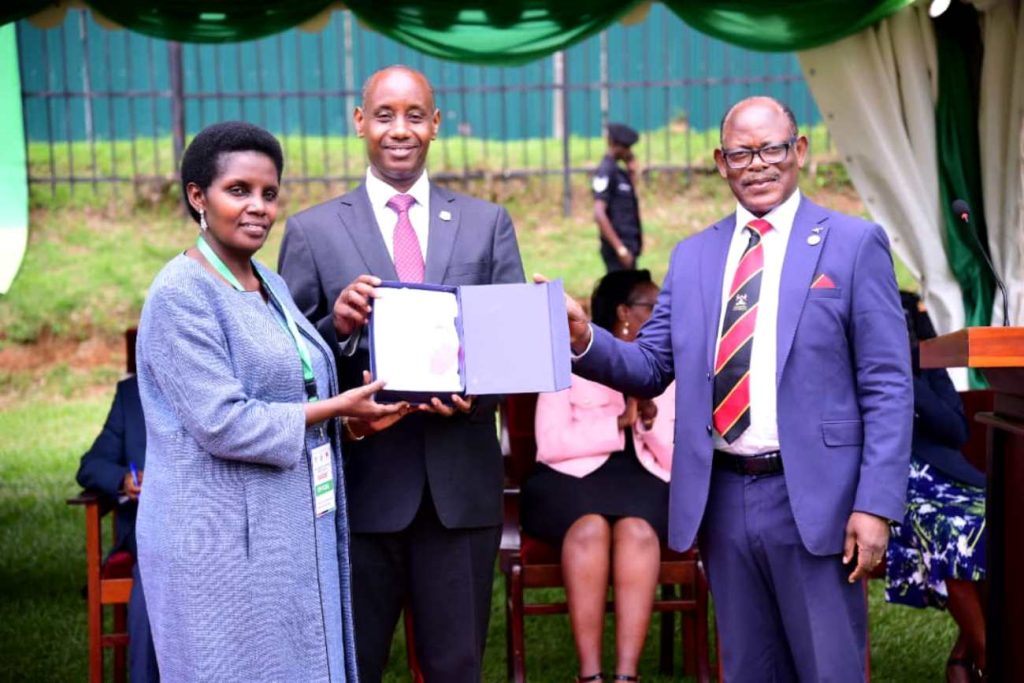
“I am proud to say that Mak-RIF has transformed Makerere’s academic and research landscape tremendously. Over the last five Financial Years, we have worked with other key stakeholders including Government ministries, institutions, agencies, organizations, and the private sector. Together, we have continued to increase the local generation of translatable research and scalable innovations that address key gaps required to drive Uganda’s development agenda, especially the un-funded priorities” stated Prof. Nawangwe.
In the same spirit, the Vice Chancellor applauded the Principal Investigator and Team Leader DARP, Mrs. Patience Rubabinda Mushengyezi and all the Team Members for the hard work that has improved the status of academic records and processes from manual processes to e-services. The DARP project is a collaboration between the Academic Registrar’s Department, College of Education and Externals Studies (CEES), College of Computing and Information Sciences (CoCIS) and the Directorate of Information and Communication Technology Support (DICTS). The DARP Project team includes: Prof. Betty Ezati, Dr. Peace Tumuheki, Dr. David Luyombya, Dr. Joyce Bukirwa, Ms. Ruth Iteu Eyoku, Mr. Juma Katongole, Mr. Joshua Muhumuza and Mr. Lubowa Gyaviira.
The Vice Chancellor also thanked the Makerere University Research and Innovations Fund (Mak-RIF) and the Mastercard Foundation for supporting different phases of the DARP Project.
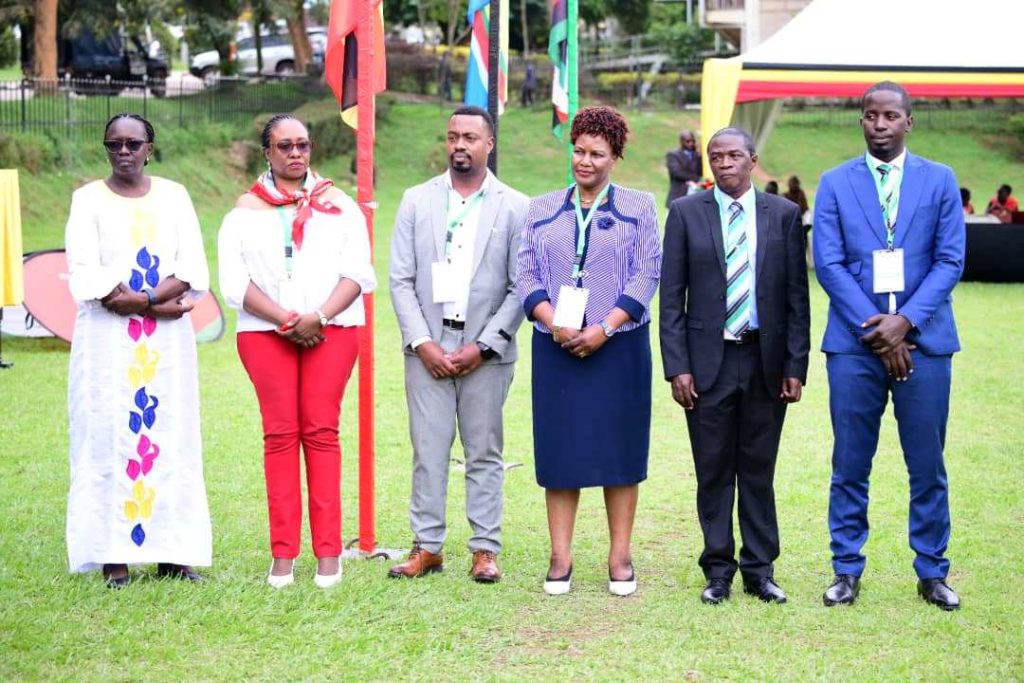
Mrs. Lorna Magara, the Chairperson of Makerere University Council acknowledged that launching the DARP project at Makerere University marked a significant step forward in digitalizing higher education services. She underscored that the transformational power of digitalization could not be overstated. She stated that by implementing an Academic Records Management System, the University would streamline the tracking and retrieval of academic files and establish a robust platform for digital certification and record verification.
“In an era where credential fraud poses a significant challenge, the DARP Project reinforces transparency, trust, and confidence in our academic processes. It is testament to our commitment to excellence. The DARP Project heralds a new era; one where our certificates and transcripts are shielded against increasingly sophisticated forgeries. By providing digitally verifiable academic documents, we empower employers worldwide to expedite verification procedures,” she articulated.
The Chairperson stated that Makerere University aims to create a dynamic and integrated learning environment with a goal to equip students with the skills and knowledge needed to thrive in an ever-evolving world. She emphasized the need to prioritize student-centeredness and adaptability which vision perfectly aligns with the DARP Project to ensure that the most deserving students can compete fairly in the job market alongside genuinely qualified candidates.
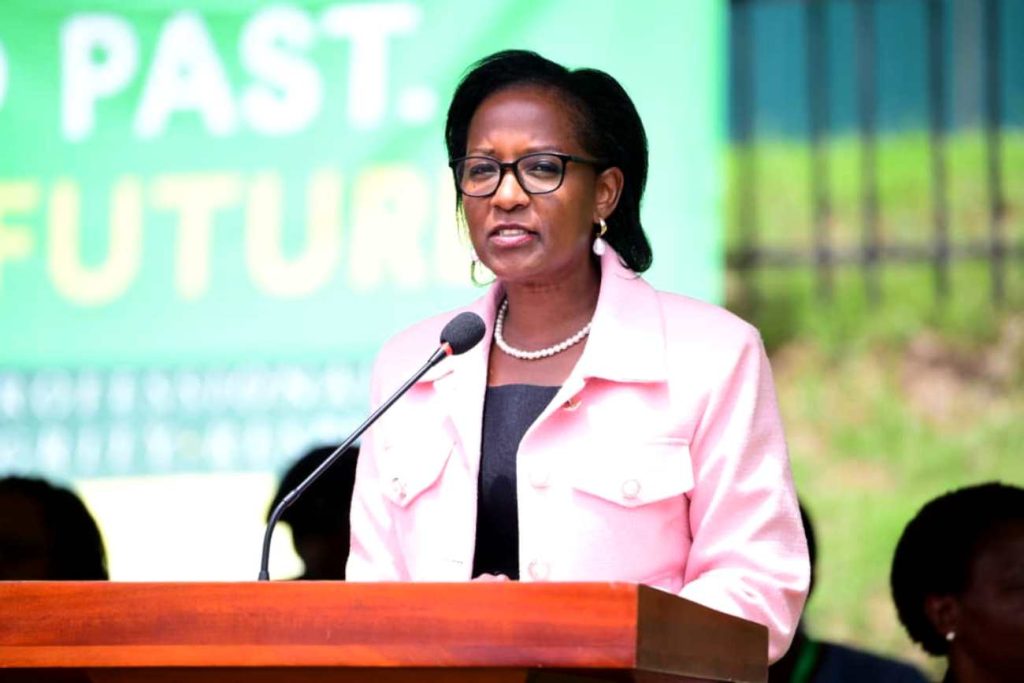
She advised that a system’s effectiveness hinges on the quality of input it receives, therefore, meticulous attention to detail is essential to ensure that the necessary information is accurately fed into the system to yield the expected outcomes. She recommended that vigilant effort has to be invested in ensuring quality processes in how the information is gathered and fed into the system, and the quality of persons tasked to do the work.
Mrs. Magara praised the DARP Principal Investigator for initiating the project in support of the University’s efforts to; address the critical element of maintaining integrity of academic records, significantly contributing to the University’s commitment to digitizing systems, and upgrading the process of archiving of records for ease in verification, certification, and retrieval.
She also extended appreciation to the Government of Uganda for the provision of funds through Mak-RIF, and to Mastercard Foundation for the provision of equipment and other support that will facilitate safe processing and storage of the academic documents.
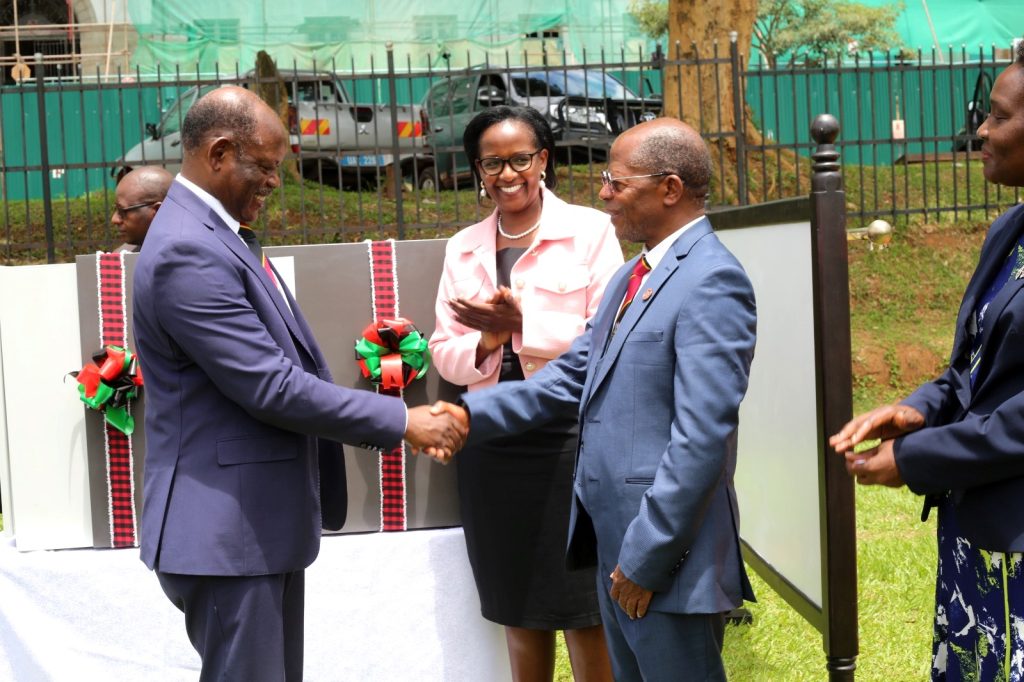
The Principal Investigator and Team Leader, DARP project, Mrs. Patience Rubabinda Mushengyezi proclaimed that the launch of the project was the birth of a new era in records management at Makerere University.
To enable the audience to understand and appreciate the situation before the DARP project, Mrs. Mushengyezi shared a documentary that highlighted the transformation from a purely manual process to a digital one. She added that the digitalization of student records from the 1980s changes the narrative of delays and long queues to fast, timely and friendly services to the students.
The Principal investigator disclosed that the DARP project team’s aspiration was to have the digitalization of students’ records rolled out in all the schools and colleges of the University. She observed that because of the hard work of the DARP team, they now have clear and well organized documents and the ‘ugly’ records shall never be seen again since they no longer exist. She expressed gladness that what started as a vision had become reality, culminating in the launch of the DARP project.
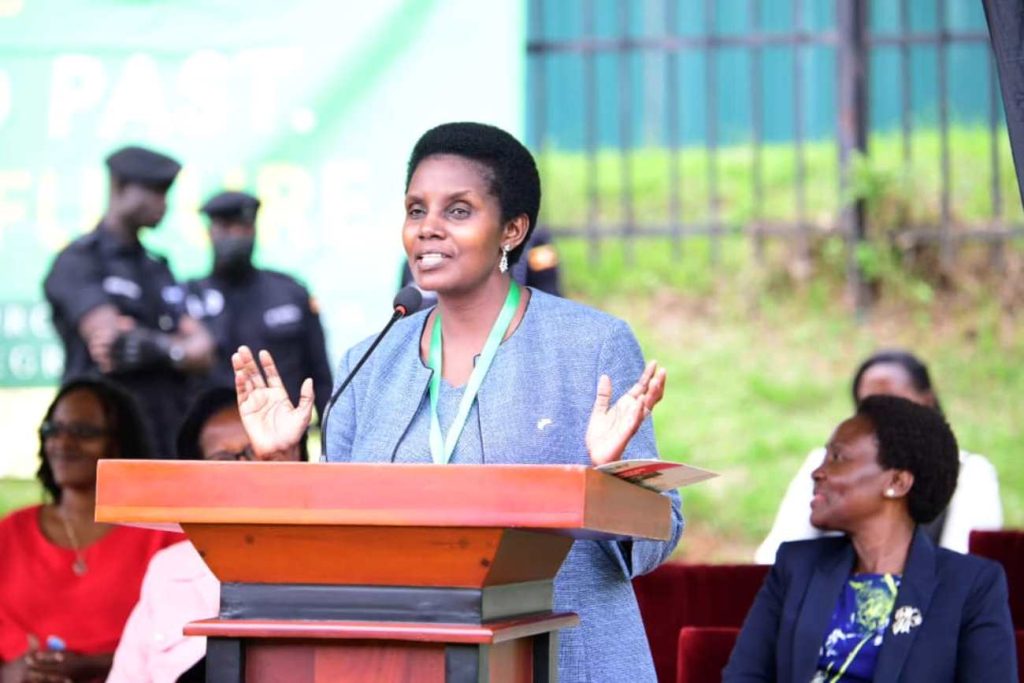
“Today, Makerere University is launching a new era of digital transformation in the management of students’ records and service delivery. We are changing the narrative of long queues, lengthy processes and we are now moving to efficient and digital services. We are here also to commission the registry of the students’ records and archive. The registry has been fitted with modern shelves with the capacity of storing over 30,000 students files but as we have seen, there is room for improvement and expansion. The archive has been fitted with modern shelves that have a capacity of storing over 100,000 students’ files and 21 wagons will store 170,000 students’ files,” Mrs. Mushengyezi declared.
Recalling the genesis of the DARP Project, Mrs. Mushengyezi shared that when the Government allocated support to the university’s research and innovations fund in 2019, she approached her colleagues and together, they submitted a project proposal. The project identified several challenges which were affecting records management at Makerere University namely; manual records handling, inadequate storage space, inadequate security for records, inexistent policy on records management, and lack of a system to streamline records management. The DARP project therefore set out to address these gaps with the ultimate goal of operating e-services.
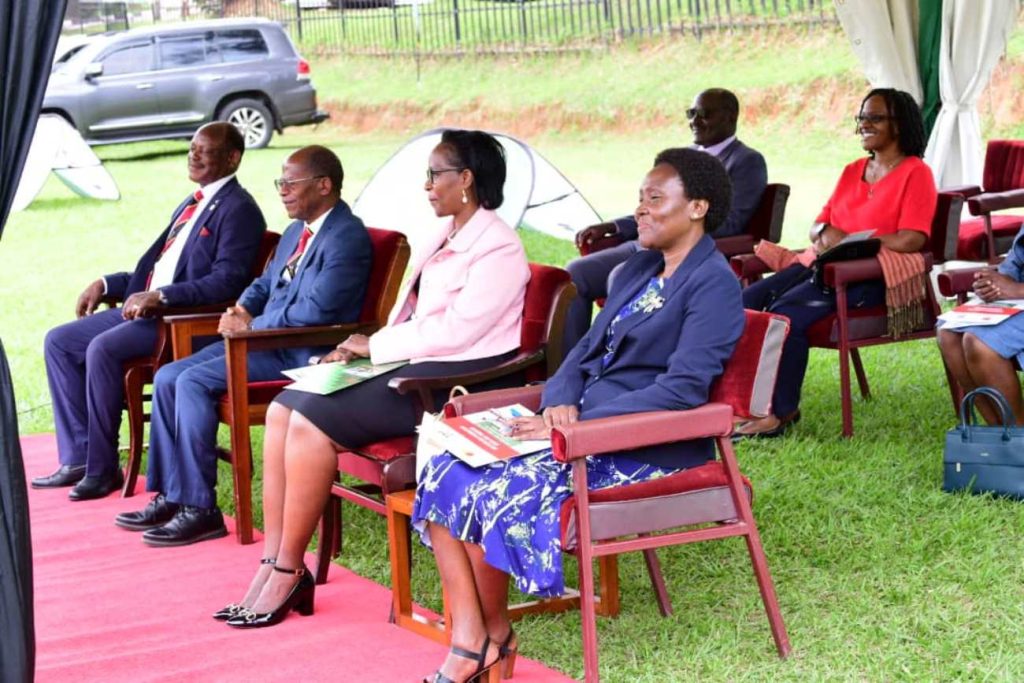
“The objectives of DARP Project were to digitalize academic processes including students’ files and examination results and other documents like senate minutes. We wished to establish a students’ records verification and certification Centre. We also wanted to use ICT to improve efficiency in conducting senate meetings and to archive existing manual documents into properly bound and referenced files. It has been a lot of hard work by the project team, but we have seen God’s hand in this transformational journey. I wish to say that we have achieved 95% of our objectives,” Mrs. Mushengyezi stated.
The Principal Investigator noted that the DARP project had created efficiency in the academic Registrar’s department with ability to generate reports on number of students by categories such as course, graduation cohort, academic disciplines i.e. Medicine, Law, Engineering etc., current enrolment and progression, as well as policies passed by the University Senate per year, and so on.
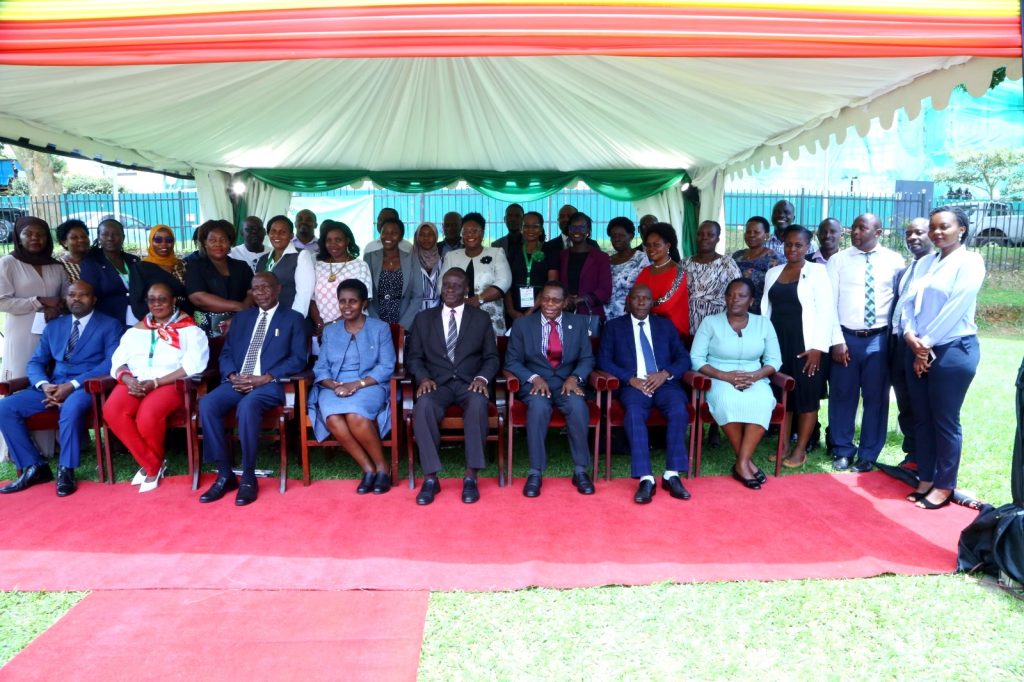
She thanked the Government of Uganda for funding the entire process by providing laptops, access control systems, CCTV cameras, printers, furniture, archival boxes, the 21 shelves, the wagons, stationery and facilitation of the entire team. She also thanked Mastercard Foundation for the support through the relief fund.
She appreciated the entire Makerere University Council and Management for the support rendered towards the establishment of the DARP project and for prioritizing the Project as a university programme. In a very special way, she acknowledged Prof. William Bazeyo, the former Deputy Vice Chancellor (Finance and Administration), Prof. Fred Masagazi Masaazi-Chairperson of Mak-RIF Grants Management Committee (GMC), Prof. Umar Kakumba, Deputy Vice Chancellor (Academic Affairs), Mr. Alfred Masikye Namoah, former Academic Registrar and the Academic Registrar, Prof. Buyinza Mukadasi, the University Secretary, Mr. Yusuf Kiranda, Deputy Registrars namely Mr. Charles Ssentongo and Mr. Tom Otim, for providing tireless support.
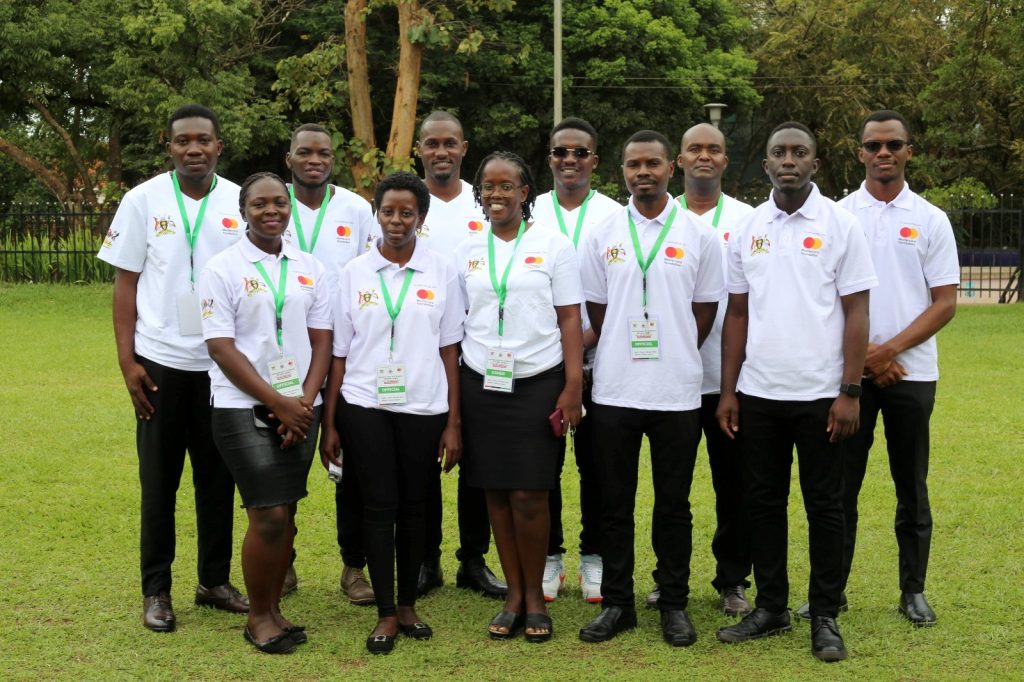
In addition, she recognized the supervisors in the Directorate of Research and Graduate namely Prof. Edward Bbaale and Ms. Prossie Nakayiki.
The Principal Investigator, Mrs. Mushengyezi also appreciated the members of staff whom she referred to as DARP Foot Soldiers for organizing, sorting and scanning the records.
In recognition of her selfless service and leadership, the DARP project team members through the Vice Chancellor, Prof. Barnabas Nawangwe presented Mrs. Patience Mushengyezi with a plaque and bouquet of flowers.
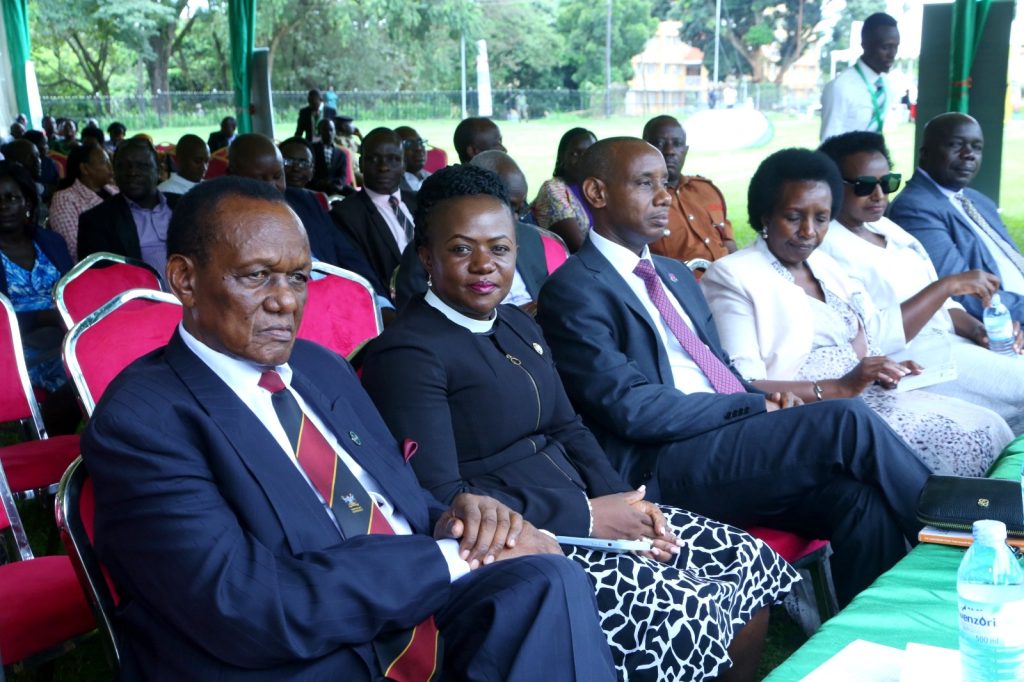
The DARP project launch was graced by the Chancellor Emeritus, Prof. Ezra Suruma, Members of Parliament, Vice Chancellors of other Universities, former Vice Chancellors, former Deputy Vice Chancellors in charge of Finance and Administration, the Makerere University Students’ Guild, and Mrs. Mushengyezi’s family. The Chaplain, St. Francis Chapel, Rev. Dr. Lydia Nsaale Kitayimbwa led the opening prayer while the event was moderated by Dr. Zahara Nampewo, the Deputy Principal of the School of Law and Ms. Ritah Namisango, Principal Public Relations Officer and Chairperson of the Protocol, Publicity and Media Sub-Committee for the launch. The Department of Performing Arts and Film was on hand to lead the anthems and keep the guests entertained.
General
Mak holds Mental Health Awareness Campaign for International Students
Published
4 days agoon
April 22, 2024By
Mak Editor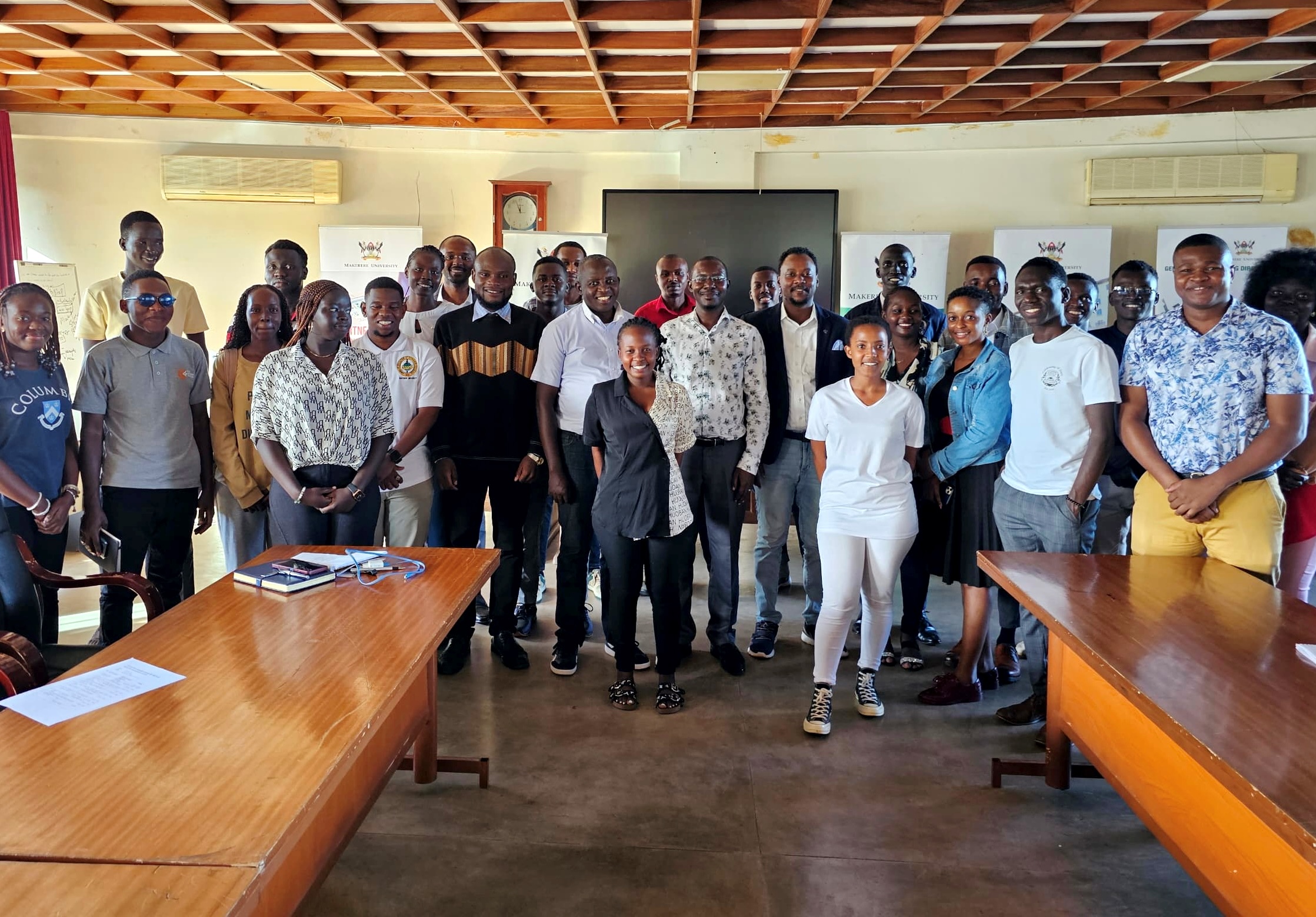
By Betty Nabisubi
On Friday 12th April 2024, over 100 international students convened at Makerere University to participate in the Mental Health Awareness Campaign organized by the International Students Union in partnership with the Counselling and Guidance Centre, International Office and Office of the Dean of Students.
The campaign, which included both physical and virtual participants, rallied international students to always ask for help. The annual event enables students to participate in engaging discussions, and provides a platform for them to openly share and address personal and academic challenges, both on and off campus.
The aim of holding a mental health awareness campaign for international students in the university is to promote mental well-being and provide support and resources for students facing mental health challenges. Furthermore, it seeks to raise awareness about common mental health issues, reduce stigma surrounding mental illness, and educate students on available mental health services and support networks. Additionally, it aims to empower students to recognize signs of distress, encourage help-seeking behavior, and foster a supportive and inclusive campus community where students feel comfortable discussing mental health concerns.
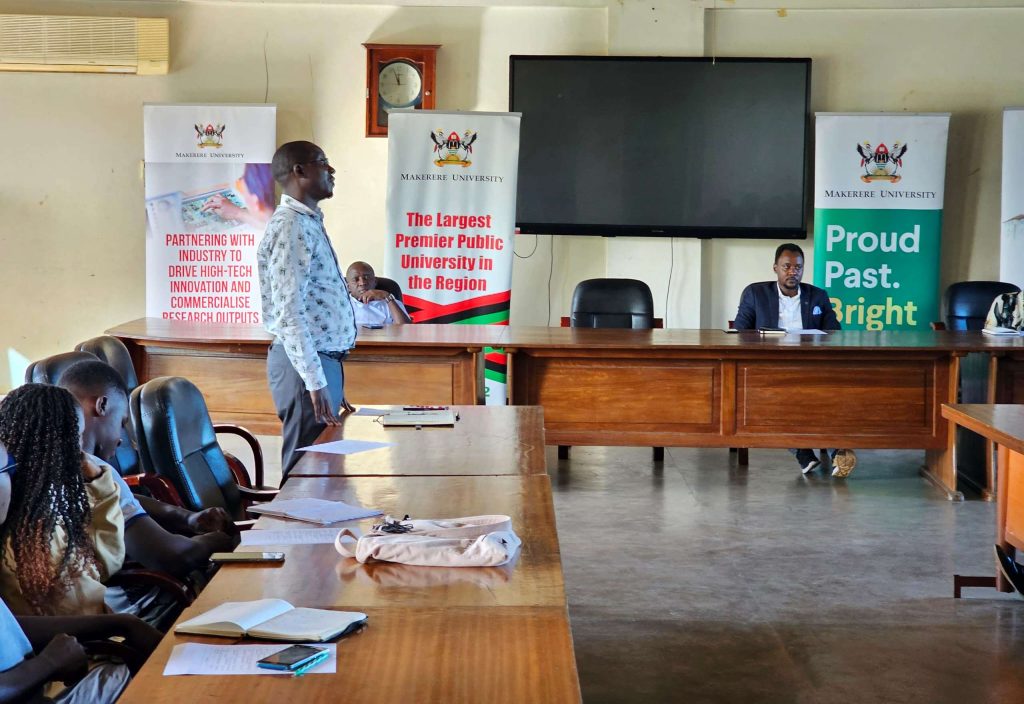
In line with the Mental Health Awareness Campaign theme; It is ok to ask for help, each Official urged the international students to seek guidance and support from the right offices and entities within the Makerere University system.
The Office of the Dean of Students represented by Mr. Peter Mwanja, Warden of University Hall emphasized the importance of students seeking help rather than isolating themselves in their hostels when faced with problems. He urged students to refrain from complaining about lack of assistance, but instead take action by speaking up when faced with challenges. Mr. Mwanja pledged to stand with the students throughout their academic journey so as to ensure that they have a fruitful stay at Makerere University.
In the same spirit, the Manager of the Makerere University Counselling and Guidance Centre, Mr. Henry Nsubuga called upon international students to utilize their services. He appealed to students to seek for help whenever they feel distressed.
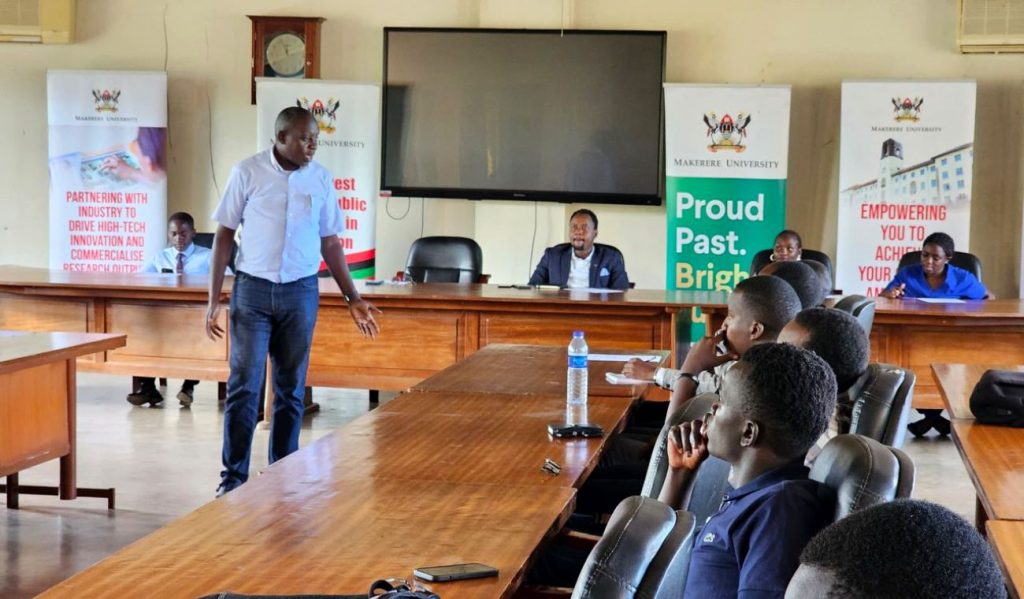
“Please come to the Centre when you need help. The Centre is ready to provide assistance upon any distress signal. I assure you that nobody will judge you for not being okay. We have professional counsellors who are willing to help,” remarked Mr. Nsubuga. The Makerere University Counselling and Guidance Centre is conveniently located at Plot 106, Mary Stuart Road, opposite Mary Stuart Hall.
Dr. Gardner Herbert from the Julius Nyerere Leadership Centre at Makerere University emphasized the importance of emotional intelligence, which encompasses the ability to understand, manage, and express one’s own emotions effectively, as well as to recognize and respond appropriately to the emotions of others. He highlighted the significance of students possessing skills such as self-awareness, self-regulation, social awareness, and relationship management.
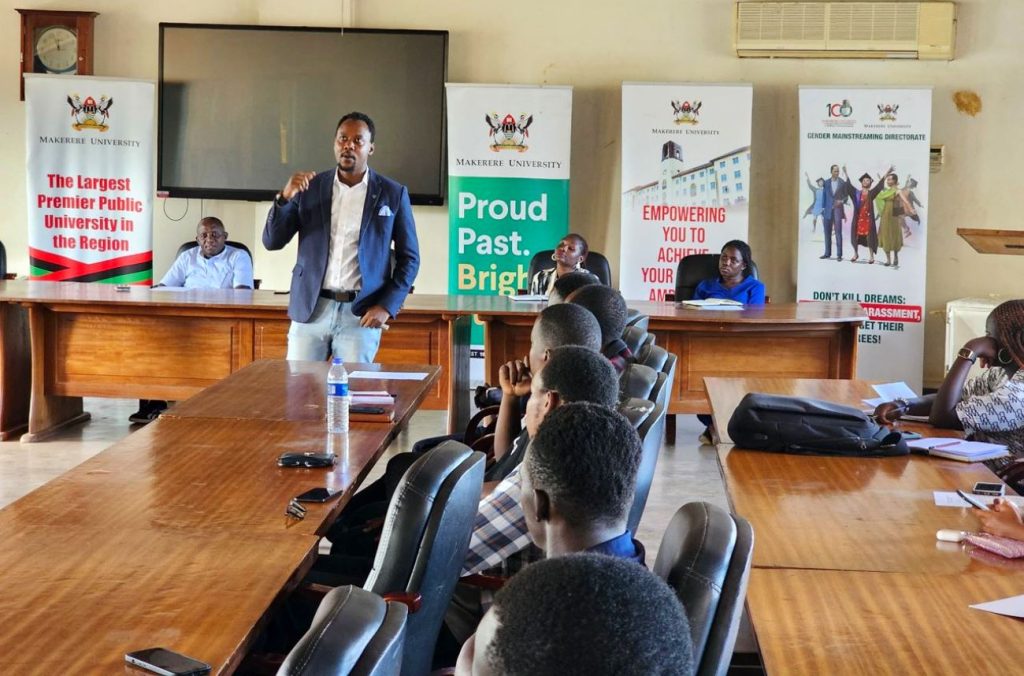
Self-awareness, he emphasized, serves as the foundation of emotional intelligence. This involves recognizing and understanding one’s own emotions, strengths, weaknesses, values, and motivations. Dr. Gardner explained that ndividuals with high self-awareness are better equipped to comprehend how their emotions influence their thoughts and behaviors, leading to more informed decision-making and greater self-control.
Mr. Gerald Ochwo on behalf of the Makerere University International Office encouraged the audience to visit the premises on Flat A5, Block A, Lincoln Flats for their mandate is anchored on ensuring that International students’ university experience is enriching. Furthermore, he emphasised the importance of students managing their visas proactively, instead of rushing to renew them either at the last minute or upon expiry. He pledged to organize more events to foster relationships among students.
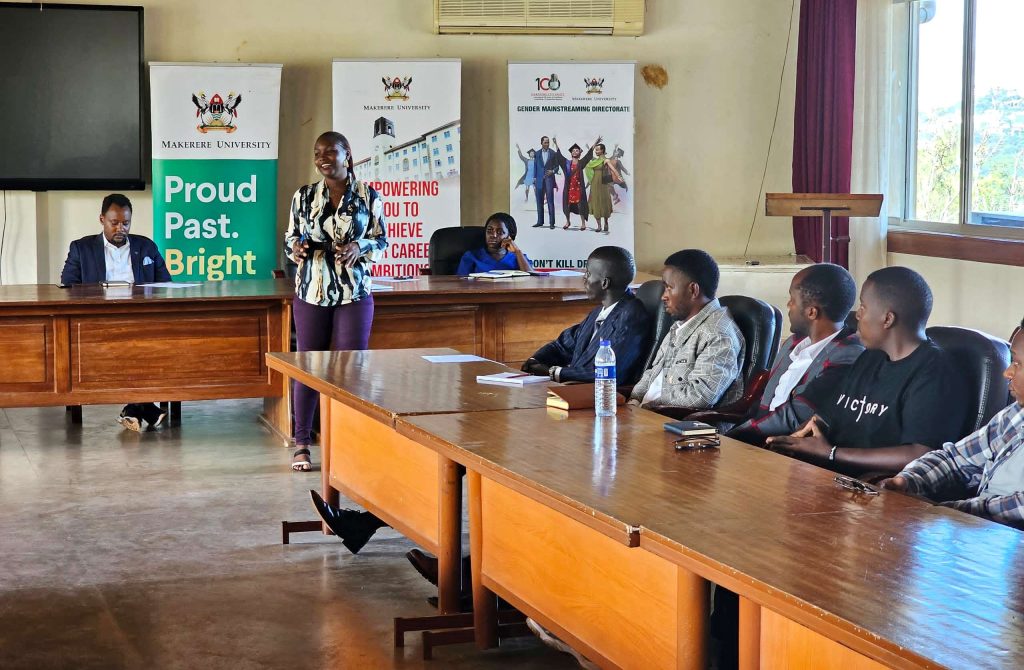
Focusing on nurturing a supportive environment for students away from home, the International Office invited Ms. Olivia Mwanje, a student of Makerere University pursuing a Master’s degree in Climate Change and Development at the College of Agricultural and Environmental Sciences to share a lived experience.
Ms. Mwanje was one of the beneficiaries of the exchange students’ programme to Utrecht University in the Netherlands. Her testimony served to demonstrate to international students that with dedication and sacrifice, it is possible to leave one’s home country, study abroad, and excel both academically and personally. She encouraged students to remain focused on their academic programmes despite the allure of other pursuits.
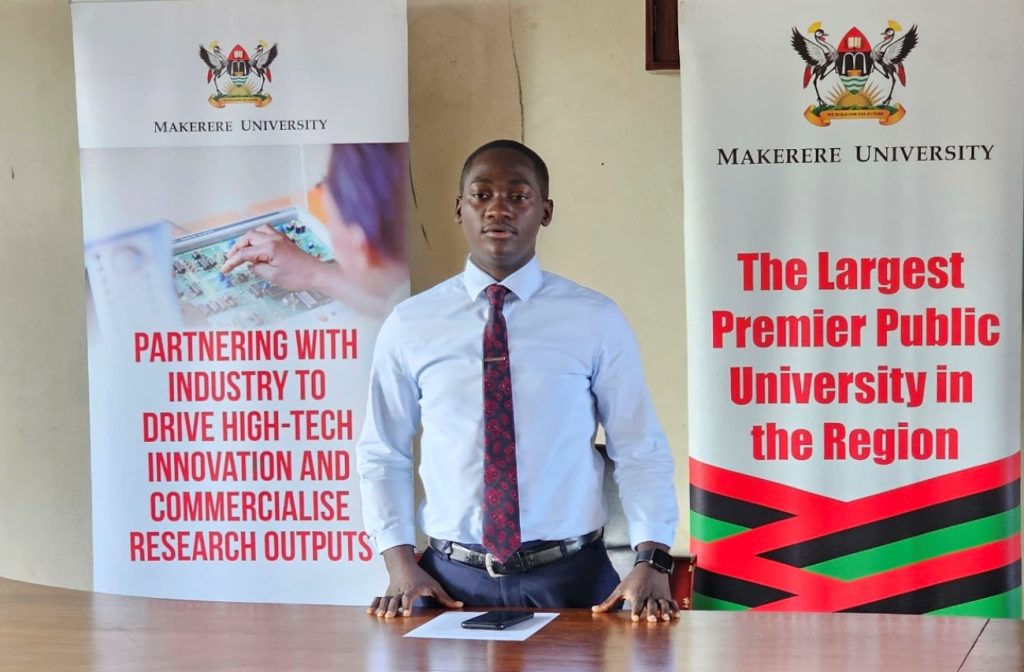
“I urge you, fellow students, to remain steadfast in your educational aspirations while exploring the opportunities available. Prioritize your academic goals over non-academic pursuits,” said Ms. Mwanje. She stressed that deviating from the primary objective leads to unintended consequences. For instance, she shared stories of students who abandoned their academic pursuits for menial jobs upon arrival abroad. Ms. Mwanje advised students to stay committed to their studies and, upon completion, pursue other non-academic endeavors if they so desire.
The Guild President, H.E. Vincent Lubega Nsamba expressed the Guild Leadership’s strong commitment to ensuring that international students have a comfortable stay at Makerere University. He encouraged international students to seek counselling whenever they feel distressed and emphasized the importance of talking to peers for support.
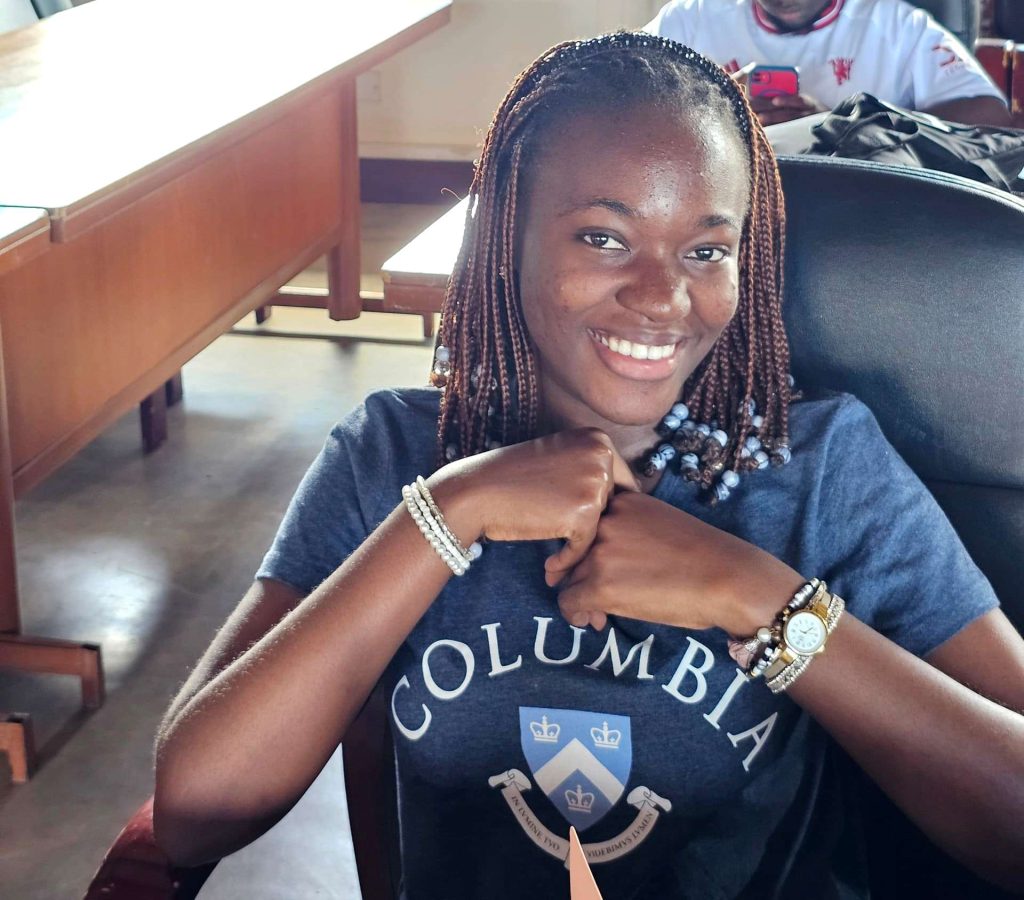
One of the international student leaders, Mr. Harrison Igwe expressed enthusiasm for organizing activities that promote unity within the international student community at Makerere University. The goal of the activities, he said, is to enhance camaraderie and strengthen support networks among international students.
Trending
-
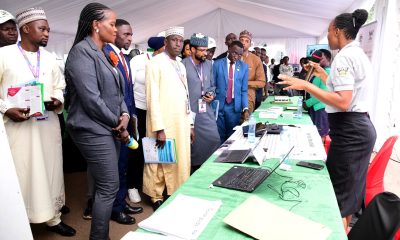
 Computing & IS1 week ago
Computing & IS1 week agoFree Course: Introduction to Data Science
-
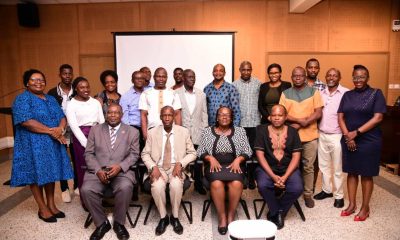
 Education7 days ago
Education7 days agoGovernment Asked to Make Fine Art Compulsory in Secondary Schools
-
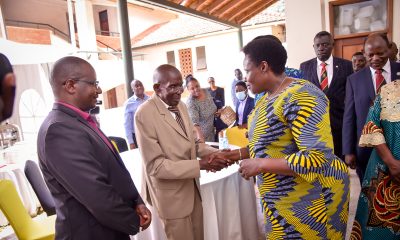
 General1 week ago
General1 week agoProf. Justin Epelu-Opio, Our Longest Serving DVC Rests
-
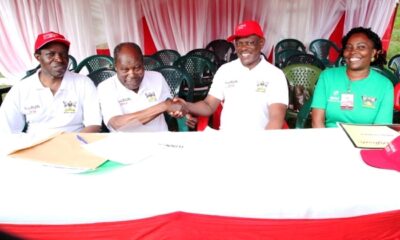
 General1 week ago
General1 week agoDr. Martin Aliker – Celebrating A Life Well Lived
-
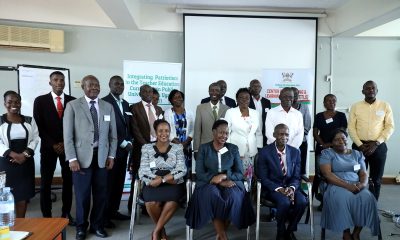
 Education1 week ago
Education1 week agoScholars call for incorporating patriotism in education curriculum
